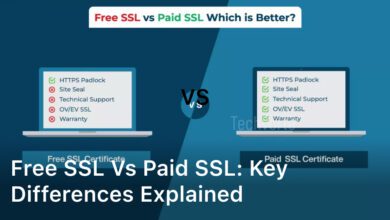In the digital age, cloud storage is vital for both businesses and people.
It offers ease and access like never before. Yet, as we move our valuable data to the cloud, worries about data privacy in the cloud and cloud storage risks are growing.
Keeping cloud data secure is crucial. A security breach could harm both organizations and people.
This guide will explore the complex field of securing cloud storage.
You will learn how to keep your data safe online.
We will cover the risks, vulnerabilities, and how to set up strong security.
By the end, you’ll know how to enjoy the cloud’s benefits while keeping your data safe.
Understanding Cloud Storage and Its Security Implications
Cloud storage lets users keep and get files via the internet. It gets rid of the need for real storage tools.
This change makes managing and sharing info easier, with cloud storage safety measures in place.
What is Cloud Storage?
With cloud storage, data is kept on offsite servers by companies like Amazon Web Services and others.
You can upload files to these servers and then see them from any web-ready gadget worldwide.
This easy access is a huge benefit of cloud storage encryption.
Benefits and Risks of Cloud Storage
Cloud storage has many pros for both businesses and people.
It’s scalable, saves money and boosts teamwork.
Instead of buying costly gear, you only pay for the storage space you use.
This reduces your start up expenses and allows you to grow smoothly.
Also, it makes file sharing and remote work a lot easier, which boosts productivity and team collaboration.
Yet, there are risks with cloud storage, like data leaks and unauthorized entry.
This is why a strong cloud storage compliance strategy is crucial.
Companies need solid protecting data in the cloud steps in place.
Things like encryption, access checks, and regular security checks help keep data safe and secure.
Is Cloud Storage Secure?
Is cloud storage secure? The answer isn’t just yes or no.
Security levels depend on the provider. They use many techniques to keep your information safe.
For example, encryption is a key tool. It turns your information into a secret code.
This makes it tough for others to read without permission.
Good cloud storage companies often encrypt your info as soon as you save it.
They also do this while moving the data.
And they sometimes let you add extra encryption.
This keeps your info super safe.
They also guard who can get into your account.
They use things like multi-factor checks to make sure only you or people you’ve ok’d can look at your stuff.
The place where they keep these data centers is tightly secured.
It has fingerprint scanners and other advanced locks.
They watch over these places day and night.
If there’s a power or temperature issue, they also have backup plans in place.
Besides, some companies let outside groups check their security.
Getting certifications proves they follow high safety standards.
Cloud Storage Security Threats and Vulnerabilities
Cloud storage lets us save data online, which is great for access, growth and saving money.
We need to know and handle these risks to keep our data safe in the cloud.
This protects our private info from being leaked or breached.
Data Breaches and Leaks
Data breaches and leaks are big dangers in cloud storage.
They can harm both companies and people.
These risks come from cyber attacks, mistakes or flaws in systems.
Famous cases, like Yahoo and Equifax, led to ID theft and other problems.
Insider Threats
Insider threats are another key risk in cloud storage security.
These come from unhappy staff, outside workers or others who misuse internal info.
They might change, share or delete data mistakenly or on purpose.
This can mess up the safety and privacy of our info.
Distributed Denial of Service (DDoS) Attacks
DDoS attacks stop us from using cloud services.
They do this by knocking a system offline with huge traffic.
This attack can cause problems like downtime, data loss, and even allow unauthorized access.
It’s a major threat to how safe and available our cloud storage is.
Securing Your Data in the Cloud
Keeping your sensitive data safe in the cloud is crucial.
It’s very important to use strong security measures.
Encryption techniques are among the best ways to achieve this.
By encrypting data as it moves and when it rests, the chance of someone getting it without permission is lower.
Encryption Techniques
End-to-end encryption is a top encryption technique.
It keeps your data encrypted from start to finish, making sure it’s safe.
This method blocks out anyone who shouldn’t see your data, including the cloud service provider.
Data at-rest encryption is also vital.
It keeps saved data safe by encrypting it first.
This helps if someone tries to steal or get into the cloud’s storage.
Access Controls and Authentication
Having solid access controls and authentication is key.
It makes sure only the right people can get to your sensitive data.
Multi-factor authentication (MFA) is a good practice.
It uses two or more ways to confirm a user’s identity, like a password and a code from a mobile app.
Role-based access controls are just as critical.
They manage who can see what data, keeping it safe.
By giving users only the access they need, organizations lower the chance of someone getting into data that’s not meant for them.
Regularly Updating Software and Systems
Always update your software and systems to keep the cloud safe.
Old software leaves a door open for hackers.
They can use these openings to get your data without you knowing.
Cloud providers update their own systems, but you need to update yours too.
Always stay on top of updates for any software you use with the cloud.
This helps protect against new threats and keeps your cloud in line with the latest rules and standards.
Cloud Storage Compliance and Regulations
More and more, companies need to make sure they follow laws about data privacy in the cloud.
Not sticking to the rules can bring big fines and harm a company’s reputation.
GDPR and Data Privacy Laws
The General Data Protection Regulation (GDPR) guides how personal data in the EU should be used and stored. These rules are pretty strict.
Any organization handling EU citizen data needs to follow them.
Industry-Specific Regulations
Some fields, like healthcare, have their own data protection rules.
The Health Insurance Portability and Accountability Act (HIPAA) protects patient information in the US.
Financial services have their own, like the Gramm-Leach-Bliley Act (GLBA) and PCI DSS.
Meeting industry-specific regulations for cloud storage compliance is key for those in special sectors.
Not complying can cost heavily, cause legal issues and shake customer trust.
Companies need to pick cloud providers carefully to ensure they’re up to security and compliance standards.
Best Practices for Choosing a Secure Cloud Storage Provider
Choosing the right cloud storage provider is very important for security.
Make sure to check the security features well.
Look into things like how they encrypt data, who can access it and their plan if something goes wrong.
This helps keep your data safe from different kinds of risks.
Evaluating Security Features
Ensure the cloud storage service you pick has good security.
They should use strong encryption, both when data is moving and when it’s at a standstill.
Access should be tightly controlled too.
This means using things like multiple steps to log in and deciding who can see what.
Reputation and Third-Party Certifications
What others say about a cloud storage provider and their official certifications matter.
Go with popular services known for their safety.
These include those that have received important security certificates like ISO/IEC 27001.
Such certificates show they take security seriously.
It’s vital that a provider knows how to handle security problems.
They should be quick and good at fixing any breaches or issues that may arise.
This aspect is critical in selecting a provider that meets your security needs upon careful evaluation.
Mitigating Risks and Ensuring Data Safety
Cloud storage offers many benefits but needs strong measures for safety.
It’s key to do regular backups and have a good disaster recovery plan.
This helps keep data safe in the cloud.
Regular Backups and Disaster Recovery Planning
Backing up data often is crucial for cloud storage security.
Your backup plan should match what data your group needs and how important it is.
You might back up daily, weekly or monthly, based on your data’s needs and the harm of losing it.
Adding a disaster recovery plan boosts your data protection.
It ensures your business can still run after a big incident or disaster.
Employee Training and Awareness
Workers are key to keeping cloud storage secure.
They should get training and learn the best ways to keep data safe.
This includes managing passwords well, spotting phishing and knowing how to handle data properly.
Regularly reminding them about these security practices is vital.
It builds a strong security culture in your team, making cloud storage safer.
Using regular backups, strong disaster recovery plans and teaching employees well can cut cloud storage risks.
This keeps your data in the cloud safe and secure.
Conclusion
More and more, people and companies are putting their data on the cloud for safekeeping.
But, keeping cloud data security tight is key. We’ve looked closely at whether is cloud storage secure in this piece.
Cloud storage is great for getting to your files easily, growing as you need and saving money.
Yet, it comes with some risks. We must be ready for hacks, leaks, threats from inside and attacks like DDoS.
To keep data safe on the cloud, we need strong encryption and tight rules on who can get in.
We also have to update our protection often.
It’s a must to follow the rules set to protect people’s privacy and follow standards in different fields.
Choosing the right cloud storage is also crucial.
Look for strong security, a good reputation and stamps of approval from experts.
This helps businesses pick the best and most secure cloud storage.
But, staying secure on the cloud is a never ending job.
We have to keep backups, plan for disasters and teach our staff well.
As dangers change, we must keep getting better at protecting our data online.
FAQ
What is cloud storage?
Cloud storage lets users save, get and share data online. No need to save it on your computer or phone. It goes to far-away computers run by special companies.
What are the benefits of cloud storage?
It makes your data easy to get no matter where you are. You can get as much space as you need. It’s also not as expensive as buying more hard drives. Plus, if something bad happens, your info is still safe.
What are the potential risks of using cloud storage?
There are a few dangers, like someone stealing your info or a big cyber attack. But, keeping things safe and using strong passwords can stop these problems.
How can encryption help secure data in the cloud?
Encryption changes your data into secret code, making it hard for anyone to steal. It’s like putting a secret lock on your information, but a digital one.
What is the importance of access controls and authentication in cloud storage security?
It’s really important to only let the right people into your data. By checking who’s trying to get in and using special passwords, you keep everything inside safe.
What is the GDPR, and how does it relate to cloud storage security?
The GDPR keeps personal info safe for people in the European Union. Everyone using cloud storage must follow these rules. If they don’t, they might get in trouble.
How can regular backups and disaster recovery planning help mitigate cloud storage risks?
Making copies of your data and having a plan for when things go wrong is key. It helps stop big losses if your info gets attacked or the system breaks. You can always get your data back.
Why is employee training and awareness crucial for cloud storage security?
Your staff can help a lot in keeping your cloud safe. Training them to be careful and know what to watch out for stops many problems. This way, data leaks and hacks are less likely.





